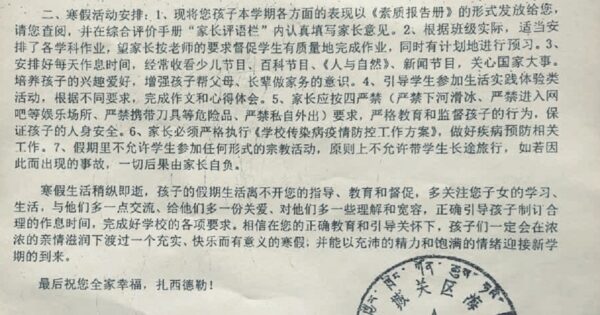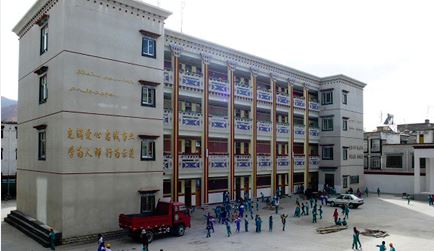As schools in the Tibetan capital of Lhasa began their winter vacations this week, parents received orders saying their students cannot be involved in any religious activities during the break.
In one such directive dated Dec. 31, 2019 and sent by Lhasa Chengguan Haicheng Elementary School, parents are told that it is the order of the Education Department that during the winter vacation, their students cannot participate in any religious activities, nor can the parents take them to faraway places. It says parents will be responsible for any consequences that result.
The announcement had seven points:
1. All aspects of your child’s performance this semester have been noted in the “quality report book” which has been issued to you. Please consult it, and after comprehensively evaluating it fill in your parental opinion in the “parent comment box.”
2. In accordance with the actual situation in class, make appropriate arrangements for homework in each subject. It is hoped that parents will follow the teachers request for students to properly complete the assignments, and at the same time carry out a preview.
3. Arrange daily schedules, and allow them to frequently watch children’s shows, educational shows, “Man and Nature,” and news shows concerning national affairs. Cultivate their interests, and strengthen their awareness of helping parents and the elderly around the house.
4. Guide students to participate in life experience activities, and according to the different requirements they should complete essays and experiences.
5. Parents should press the requirements of the Four Forbiddens (it is forbidden to go down to the river to skate on the ice, it is forbidden to enter internet cafes and other entertainment venues, it is forbidden to carry dangerous items such as knives, and it is forbidden to go out alone), strictly educating and monitoring the behavior of their children, guaranteeing the safe lives of their children.
6. Parents must strictly enforce the “School Work Plan for the Prevention and Control of Infectious Diseases,” and do well with disease prevention.
7. Students are not allowed to participate in any form of religious activity during the break, and in principle long-distance travel with students is not allowed. In the event of an accident, all consequences are the responsibility of the parents.

Prohibitions on children’s participation in religious activities in Tibet were also announced during the previous summer and winter vacations in 2018 and 2019.
Additionally, Radio Free Asia reported that in May 2018, Chinese authorities in Tibet’s Chamdo (Chinese: Changdu) city ordered Tibetan students and their parents to avoid religious gatherings and festivals during the Buddhist holy month of Saga Dawa (the fourth month that marks the anniversary of the Buddha’s conception, enlightenment and death), threatening them with unspecified punishment if they were caught ignoring the ban.

The International Campaign for Tibet maintains that by banning schoolchildren from religious activities, Chinese authorities are infringing upon basic principles of freedom of religion, as set out in the Universal Declaration of Human Rights–which China agreed to—and the Convention on the Rights of the Child, which China ratified in 1992. A state simply cannot ban children from religious activities.
Winter vacation began on Dec. 31, 2019. The Lhasa Chengguan Haicheng Elementary School’s announcement said it will reopen on March 3, 2020.